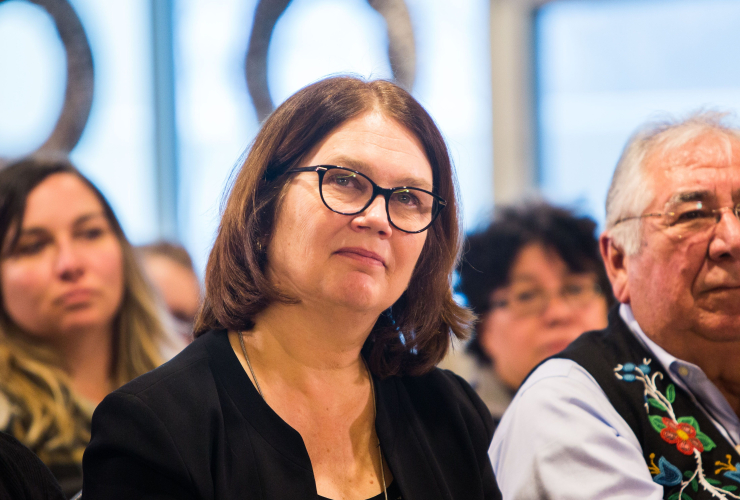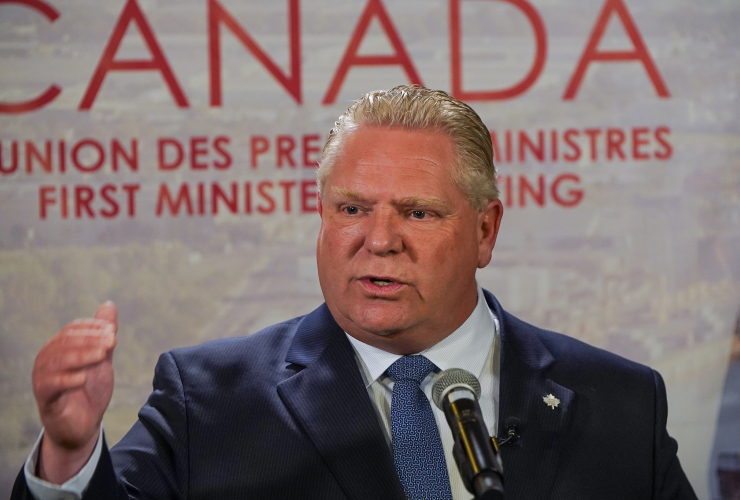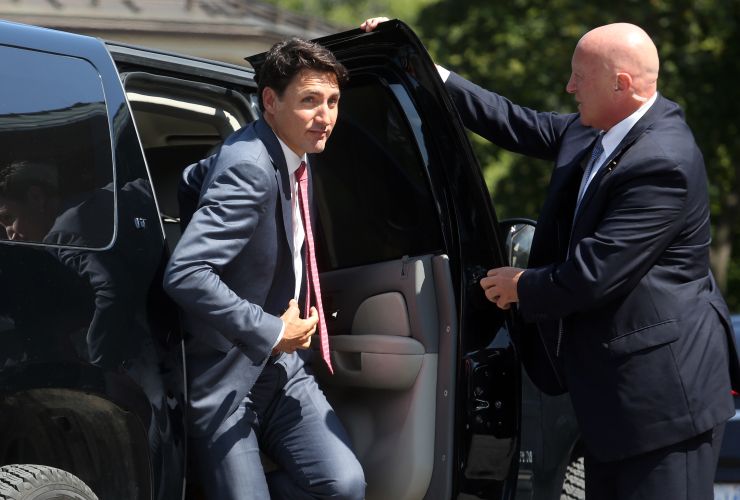With another high-profile resignation hanging over his government, a simple question by Prime Minister Justin Trudeau at the beginning of a Liberal party rally on climate change action may have had more than one meaning.
"Are there any Liberals in the house?" Trudeau asked after taking to the podium, adjusting the microphone to his height and making sure the auto-prompter was working.
After a series of departures and criticism from within his own cabinet and caucus, perhaps no one could blame the prime minister for being skeptical about whether he was facing a friendly crowd. Nevertheless, he launched into an energetic speech, touting his government's policies and actions on climate change, while fending off protests for animal rights and against his government's moves to drive pipeline construction through Indigenous territory.
Moments earlier, Environment and Climate Change Minister Catherine McKenna had pumped up the crowd, stressing the importance of tackling global warming and its devastating impacts on cities and our daily lives, while noting that Trudeau was someone who always had her back on the file.
After thanking local Toronto-Danforth Liberal MP Julie Dabrusin, and hailing McKenna, as a "total rock star" who is "doing an outstanding job for Canadians," Trudeau took a moment to address Jane Philpott's resignation over the SNC-Lavalin scandal.
"I know that Ms. Philpott's felt this way for some time, and while I am disappointed, I understand her decision to step down and want to thank her for her service," he said, referring to the head of the Treasury Board Secretariat.
Trudeau's troubles with SNC-Lavalin started last month when the Globe and Mail reported that Trudeau and other government officials inappropriately tried to interfere with a decision by former attorney general Jody Wilson-Raybould not to offer a plea deal to the company in order to help it avoid a trial and possible criminal conviction on corruption charges.
Wilson-Raybould who was moved to the veterans affairs portfolio, resigned from cabinet less than a week after the reports about political interference surfaced. She told parliamentary hearings last week that she no longer had confidence to sit around the cabinet table.
A few days later, Philpott made the same choice.
"In a democracy such as ours, and in a place where we value our diversity so strongly, we are allowed to have disagreement and debate, we even encourage it," the prime minister said.
Trudeau has previously said that Wilson-Raybould should have come to him if she had any problems about the pressure she was facing, although during her testimony before the House of Commons justice committee, she said that she actually had warned him during a meeting in September when she advised him not to politically interfere with her role as attorney general.
He has said he completely disagrees with her view that she was inappropriately pressured.
On this night, while many in the crowd chanted "Tru-deau" in support, there were also a few that disagreed about the government's climate policies for not being strong enough.
"Then don't delay on climate, don't be a climate delayer," came a voice from the crowd as Trudeau moved on to the subject at hand.
Trudeau said that "enjoying our natural world is a huge part of the Canadian identity."

After more than 20 seconds of dueling voices — Trudeau's and a string of those from the crowd, which largely made each other inaudible — Trudeau emerged with "faced with climate change, we don't have a moment to spare."
And to which the reply from the woman in the crowd came without missing a beat: "Then don't build pipelines because we can't build them. The climate scientists told us, that if we keep building pipelines we will be heading towards devastation, so don't build pipelines if you really care. Switch to renewable energy."
"No pipelines in Wet'suwet'en territory," later repeated a voice from the crowd, referring to the First Nation in central British Columbia where a subsidiary of Calgary-based energy company TransCanada bulldozed land in January, while the RCMP enforced a court order sought by the company so that it could proceed with construction.
The woman continued to shout until the Liberal supporters around clapped and cheered to drown out her voice. "How dare you do that to Jody?" she added, referring to Wilson-Raybould, the first Indigenous person to act as Canada's attorney general and justice minister.
As the prime minister's RCMP detail moved in to calm things down, Trudeau hit some talking points about the lack of any climate plan from his opponents, Opposition Leader Andrew Scheer's Conservatives.
He finished his speech to a "Trudeau" chant from some in the crowd, while most turned their attention to the task of retrieving their jackets from the mandatory coat check.

The epitome of hypocrisy:
The epitome of hypocrisy: this PM knows no shame and, although talks the talk, doesn't walk the walk .
Never liked Harper and his cronies, but at least they were true to themselves, one always knew where they stood.
J. Trudeau grandstands and lies!
What is a liberal climate
What is a liberal climate change rally anyway. His government has done nothing to fight climate change. I have a notebook filled with green initiatives done around the world and Canada is a complete laggard. The big lie, to begin with, that we can fight climate change and pump out fossil fuel was recognized for what it was by most people. Having a rally is not going to make up for lack of action.
Unfortunately Mr. Trudeau
Unfortunately Mr. Trudeau cannot run on his climate record - he's kept Harper's weak targets and we're not even close to meeting those, he's kept a lot of Harper's energy sector subsidies, these amount to a kind of anti-"carbon tax" of, if I recall correctly, of around 3%. The carbon tax initiative itself is rolling out a glacial pace in large part because of this government's failure to start a national conversation to communicate, in part, the "fear" aspect of urgency of the crisis to Canadians while (cynically?) claiming that we can reach our climate goals without the sacrifice of evolving how we currently do things. And by NOT doing stuff that might make some sense, like having a national energy policy, reforming the NEB, and taking steps to eliminate Eastern Canada's reliance on Saudi crude, cynical political calculus be damned. Instead they do crazy things like buying a 40-year old pipeline for 2X its value in pursuit of a twinning that will never be built without first stomping all over indigenous rights and ignoring "social license" of those who will bear the brunt of the ongoing risk, and of course guaranteeing that those existing, weak, climate goals will never be met.
I'm not a genius by any stretch, but I'm wondering, sunny ways be damned, how on any of these files decisions under the Conservatives would have been any different? Admittedly, less conflicted, would the Conservatives have enacted the exact same programs? It makes you wonder - who really is running this country?
And, frankly, who is Catherine McKenna, and what exactly is she working on? Time to say that after 3 years of attempting a balanced approach that they've learned some valuable lessons but have largely failed to deliver anything. Then start a national conversation, finally levelling with Canadians instead of telling us what we want to hear, raise some healthy fear, and make this next election about what it needs to be about: doing our darnedest to save the planet for our children.
All of the other stuff is just delay and distraction.
My understanding is that
My understanding is that Eastern Canada quietly, for odd just-happened-to-happen-that-way reasons, actually did mostly stop using Saudi crude a few years ago. Something to do with all the American fracked oil available, I believe. Hurrah, big improvement--we need to get out of the whole deal. Transit, electric vehicles, better city planning. I'm driving a Leaf now, and it's treating me well.
Oddly enough apparently there
Oddly enough apparently there’s an article in the National Post about it -
https://nationalpost.com/news/canada/why-has-canada-spent-billions-of-do...
For the first half of 2018 looks like Saudi imports still amounted to about $1.8B .. or roughly about $10M per day.
Happy that your Leaf works for you. :). I’m still stuck waiting for more all-wheel drive options - though I don’t drive much AWD is still a necessity in my neck of the woods.
Canada's oil imports from
Canada's oil imports from Saudi Arabia in 2018 represented around 12% of all the oil imported in Canada compared to 61% coming from the U.S. The rest was imported from Azerbaijan (6%), Norway (5%) and Nigeria (4%). All the oil coming from Saudi Arabia is imported by Irving for its refinery in St. John NB (Quebec and Ontario refineries get all their crude oil from the U.S. and Western Canada)
In the U.S., Saudi Arabia is the second most important supplier of crude oil (around 13%) after Canada (around 46%). Saudi Arabia is also the owner (100%) of the largest refinery in the Gulf Coast area, which is also the largest in North America. Enbridge Line3 expansion and Keystone XL are expected to deliver more Canadian heavy crude to that region, and will probably supply the Port Arthur refinery (owned by Saudi Arabia).
The U.S. Gulf Coast has the highest concentration of refineries in the world that can process Canada's heavy crude oil. The CAPP recognize that this region represents an important market, as indicated in their June 2018 report 'Crude Oil Forecast, Markets and Transportation' market summary: "Looking to the future, the bulk of Western Canada's growing heavy crude oil supplies would be ideally suited for the U.S. Gulf Coast market given its large heavy oil processing capacity and uncertainty around existing suppliers to this region."
How ironic this is, on the one hand the CAPP complains about crude oil imports from Saudi Arabia; on the other hand, Western Canada's oil producers want to ship more of their crude oil to the U.S. Gulf Coast.
Thanks for this, René :)
Thanks for this, René :)
This all just puts a knot in my stomach.
I suppose would the thought that we could sell our heavy crude elsewhere make the Texas refineries pay more for it, or would they simply switch to other domestically available crude? If current prices for WCS (around $35/barrel in January) are any indication of domestic supply it seems that the latter is presently a very good option for them.
As of today, March 08, 2019,
As of today, March 08, 2019, WCS price for a barrel of oil was $45.26. WTI was at $54.83 for a U.S. barrel oil.
(source: oilprice.com)
From the same source, another quite incredible story: "Russia's Oil Product Export to U.S. Surge Amid Sanctions on Venezuela". Strange how geopolitics work.
He's quite right about the
He's quite right about the Conservatives.
Conservatives: No climate plan.
Liberals: No climate action.






Comments